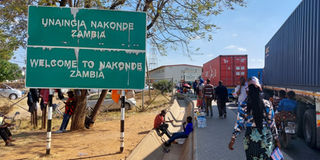Tanzanian lorry driver’s attack in Zambia raises security red flag

What you need to know:
- Initial reports suggest the driver was attacked by unknown assailants, who also attempted to extort money from the lorry’s owner
Dar es Salaam. A harrowing incident involving the assault of a Tanzanian lorry driver in Isoka, Zambia, has highlighted the growing security concerns faced by transporters operating along the Tanzania-Zambia border.
The Ibrahim Rashid Mwaja Company’s Operations Manager, Mr Abdallah Rashid, recounted the distressing events that unfolded on the night of December 19, 2024, when he received a WhatsApp call from an unknown individual informing him that one of his lorries had been involved in an attack.
The incident occurred at around 10 p.m. East Africa Time (9 p.m. in Zambia) when Mr. Rashid was contacted by a passenger on a bus travelling from Lusaka to Nakonde at the Tanzania-Zambia border.
Speaking to The Citizen on Saturday, December 21, Mr Rashid said the caller explained that after the original driver had been severely injured, a fellow passenger had taken control of the lorry.
“The injured driver, who had suffered severe machete wounds to his head, was transported by bus to Isoka Hospital for emergency treatment,” Mr Rashid quoted the caller.
He initially felt sceptical, as the truck’s Global Positioning System (GPS) showed the vehicle was still en route, leading him to believe the situation might not be as urgent as the caller had described.
However, the passenger’s account quickly painted a darker picture as the bus neared Isoka; passengers noticed a lorry parked on the roadside, surrounded by people engaged in an argument.
According to him, the bus driver stopped the vehicle out of caution, noting that it was at this point that the attackers fled in a pickup truck or Land Cruiser Hardtop.
Narrating the incident, he said the Good Samaritans who approached the lorry found the driver in critical condition, struggling to speak and appearing close to death. He said, desperate to help, the caller contacted him after securing the phone number written on the side of the truck.
“While on the phone with the caller, another call came in from the driver’s phone, stating that the driver had been detained by the Zambian police for expired travel documents,” said Mr Rashid.
This second call only added to the confusion, as Mr Rashid knew that the driver had recently renewed his travel documents before departing for Zambia, claiming expired documents seemed suspicious.
Even more perplexing was the fact that the GPS still indicated the lorry was moving.
“I was confused because I could see the vehicle moving on GPS, while others reported the driver had been attacked, and yet someone else said he was arrested,” explained Mr Rashid.
After some time, he said it was confirmed that the driver had been admitted to Isoka Hospital and the lorry had been parked at the facility’s premises.
“Thankfully, despite the violent attack, all items in the lorry, including a consignment of soya meal being transported from Ndola to Dar es Salaam, Tanzania, were found intact,” he said.
“After seizing the driver’s phone, the attackers contacted the consignment’s owner, demanding a ZMW 1,500 (approximately Sh150,000) penalty for the alleged expired travel documents. However, no money was transferred, and the motive behind the attack remained unclear,” added Mr Rashid. Furthermore, the driver, whose injuries were deemed critical, was transferred to Mbeya Zonal Referral Hospital in Tanzania for specialised treatment on December 20, 2024.
He had been moved from Isoka Hospital to Tunduma earlier that day but was referred to the zonal hospital as the facility on the Tanzanian side was unable to handle the severity of his injuries.
According to him, a driver from Nakonde was sent to Isoka to assess the situation, confirming that the driver required urgent medical care in Tanzania.
Mr Rashid expressed deep concern about the safety risks faced by transporters, emphasising the difficulty of obtaining assistance during such incidents.
“We often rely on colleagues in the industry for support during these situations,” he said.
He called on the government to engage with Zambian authorities to enhance security measures along the border, which is often plagued by criminal activity.
“I urge the government to work closely with the Zambian authorities to improve security. The safety of transporters and their cargo should be a priority,” observed Mr Rashid.
The driver’s condition remained critical, but the hospital confirmed that he was showing signs of improvement.
The Mbeya Zonal Referral Hospital Executive Director, Dr Godlove Mbwanji, confirmed that the patient was conscious and responding to treatment.
“The attending doctor is following up on diagnostic results to determine the next steps in his treatment,” said Dr Mbwanji on the phone.
He said preliminary reports suggested that the patient may have experienced weakness on one side, but further tests, including a CT scan, were being conducted.
This incident is part of a troubling trend of attacks on transporters in the region, with the Tanzania Medium and Small Truck Owners Association (Tamstoa) Chairman, Mr Chuki Shaban, revealing how the rising insecurity is affecting drivers operating on the Zambian side of the border.
“Our members have been complaining about frequent incidents of insecurity that threaten both the lives of drivers and the safety of their cargo,” he said, calling for urgent government intervention to improve safety along the border.
“We ask for the government’s intervention through bilateral talks to ensure drivers are as safe on the Zambian side as they are in Tanzania,” he insisted.
As authorities in both countries work to address the issue, it remains clear that urgent action is needed to safeguard the lives of those working on the frontlines of transport and trade in East Africa.
The violent assault on this lorry driver has brought to light the precarious conditions under which many transporters operate, with no guarantees of safety in regions known for frequent criminal activity.




